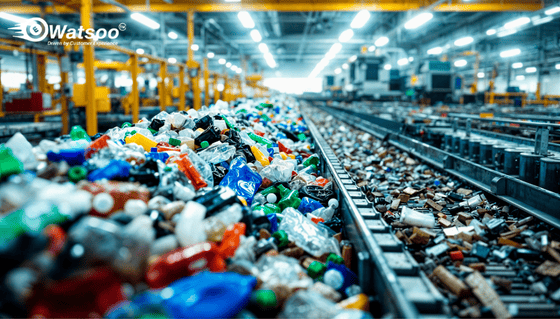Waste management solutions are vital to recycling, reuse, and reducing the waste produced by industrial development. A strong WMS (Waste Management System) can resolve the challenges faced during waste handling with technical advancements. It will enhance sustainability and make waste handling more efficient for the industries.
Waste management software Numerous advanced solutions (IoT, Machine Learning, Artificial Intelligence, and smart sensors) are integrated into the . These technologies support companies in better waste management through organized, ultra-modern, and data-driven processing. You can go through the blog and explore the Waste management software solution, which is simplified with digital tools and software solutions.
What Is Waste Management System?
Waste management is handling the physical waste produced by the industries, and an IoT-based waste management system supports managing it digitally using advanced systems and solutions. It is a collective structure of digital tools designed to organize waste from commencement to final disposal.
The waste management process includes collection, conveyance, recycling, and finally disposing of the garbage material according to its type. The waste can be industrial, commercial, biomedical, hazardous, organic, and domestic garbage.
What is the purpose of the WMS?
The main objective of any strong Waste Management System (WMS) is to lessen the harmful effects of hazardous waste on the environment. The WMS system simplifies the digital waste management process for different industries and sectors.
- It tracks garbage vehicles, generates real-time reports, provides accurate analysis, and improves operational efficiency.
- It also manages legal compliance using ultra-modern technologies like advanced sensors, dashboards, and software.
- It facilitates waste segregation and saves time for the industries while digitalizing the manual work.
Waste Management System in India
Due to a huge population, India produces immense garbage waste. This waste needs to be managed using advanced waste management solutions. The nation has faced numerous challenges in waste management. Thus, the country is now advancing to digital solutions for this major issue.
One can observe that India has taken many initiatives to manage the produced waste and spread awareness with advanced infrastructure. The most suitable example would be Swachh Bharat Abhiyan that is a smart approach for effective waste management. Private sectors and industries are opting for IoT-based Waste Management solutions to transform and digitalize the management operations. You can rely on Watsoo’s IoT-based Waste Management System to digitally handle industrial waste.
Waste Management Solutions
Many waste management solutions are available for industrial, domestic, agricultural, and commercial garbage. The most popular waste management solutions are landfills, incineration, recycling, energy recovery, waste reduction, reuse, and responsible disposal of hazardous and electronic waste.
IoT-Based Waste Management System
IoT-based waste management is integrated with the smart Internet of Things technology. It modernizes waste management using the inserted sensors (Data Generation), data analytics (Accurate Reporting), and GPS solutions (Vehicle Tracking) in the waste management operations. The business can use predictive analysis and optimize routes for operational efficiency.
Key Components of an IoT-Based Waste Management System
An IoT-based waste management software is highly beneficial for industries as it has advanced components for a waste management solution. The main components include:
Waste Management Software
The software is a centralized solution for waste management operations as it remotely controls and handles the processes.
GPS-enabled Fleet
Waste collection vehicles (Trucks) are integrated with GPS devices for route optimization and real-time tracking.
Analytical Dashboards
The waste management software generates data analytical reports to provide actionable insights for accurate decision-making.
Sensor-based Dustbins
The sensors detect the garbage level in the dustbins and can provide real-time alerts to clean them.
Cloud-based Integration
The data accessibility becomes easy using the cloud integration as it enables the system scalability and reporting.
Advantages of an IoT-Based Waste Management System
The system is used by various top industries and the sectors that need a digital solution for waste management. You can learn here about the benefits of the IoT-based waste management solution.
Operational Efficacy
The system users can optimize the routes, avoid idle time, and digitize most of the process to enhance operational efficacy.
Cost-Effective Solutions
The waste management software minimizes manual interference and manages fuel usage and vehicle maintenance expenses.
Data-Driven Insights
With the predictive analysis facility, businesses can anticipate waste generation updates and upgrade the infrastructure accordingly.
Process Transparency
You can improve driver’s liability by monitoring the driving behaviour using the process transparency and improving transparency.
Lessen Public Health Hazard
Precise waste management and avoiding medical troubles due to the bacteria produced in the unmanaged waste for better hygiene.
Environmental Solutions
The system minimizes fuel wastage and improves air quality by reducing greenhouse gas emissions.
Long-Term ROI
The initial investment in the Waste Management System can provide long-term Return on Investment benefits for businesses.
Reusable Material Recycling
Advanced analytical tools and solutions digitally enable waste segregation and the reuse or recycling of the materials.
Machine Learning in Waste Management Systems
Machine Learning (ML) is another important aspect of waste management software. ML enables the industries to get historical data tracking, provides predictive analysis by observing waste production patterns, detects missed picks, optimizes pick-up scheduling and manages illegal dumping. This technology offers an advancement in the IoT-based waste management system and innovative solutions like:
- Image Recognition Facility
- Irregularity Detection
- Pattern-Predictive Analysis
IoT and ML integration make a strong alliance that proactively handles the complete waste management process. Watsoo’s Waste Management Software integrates IoT and ML solutions with AI technology and provides a Smart Waste Management System.
What Is the Smart Waste Management System Using?
The smart waste management software uses IoT-based sensors to monitor the garbage container levels, observe temperature changes, and spot movement.
- These sensors or modern devices are connected to the networks (cellular, low-power, or wide-area) to transfer the gathered data and information.
- This process is completed without any human involvement.
- The waste management process involves ML, AI, and cloud computing solutions for automation and accurate analysis.
Watsoo’s IoT-Based Waste Management System
Watsoo’s IoT-based WMS is an advanced tracking solution in the waste management industry. It is designed to digitally manage the assortment, conveyance, recycling, and final disposal of non-usable material in waste. The Watsoo WMS solution reduces human errors, improves fleet productivity, and ensures timely garbage collection.
You can optimize garbage truck routes, control driving behaviour, and provide a real-time tracking facility for the industries with Watsoo’s integrated IoT technology. Watsoo, as a device manufacturer and technical solution provider, works in fleet productivity and driver liability while effectively managing waste collection.
Watsoo’s ultra-modern solutions for IoT-based waste management systems have the key features for advanced and transparent waste management operations:
- Predictive Analysis
- Vehicle Tracking
- Driver Behavior Monitoring
- Emergency Button
- Route Optimization
- Custom Alerts
- Reporting Tools
- Mobile App Integration
The Future Technology of Waste Management
Waste management is a huge issue for the industries, and future technologies like AI solutions, cloud servers, and machine learning advancements will improve automation, data digital maintenance, and enhance sustainability.
People can observe smart dustbins, garbage container level sensors, AI robots, garbage truck tracking solutions, recycling apps, and many advanced solutions being developed for waste management.
Conclusion
A modern waste management system is a technical solution for industrial, biomedical, hazardous, organic, and general waste. IoT, AI, ML, and cloud-based advanced solutions control waste management digitally. Watsoo’s IoT-based waste management system software integrates smart digital waste management tools for advanced solutions. You can connect with the team to learn about the waste management software benefits.


